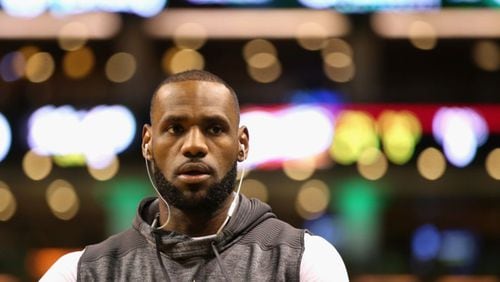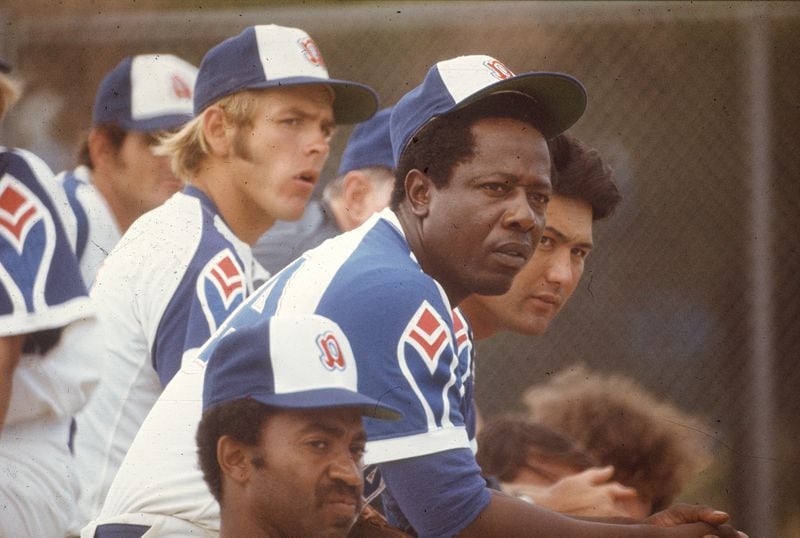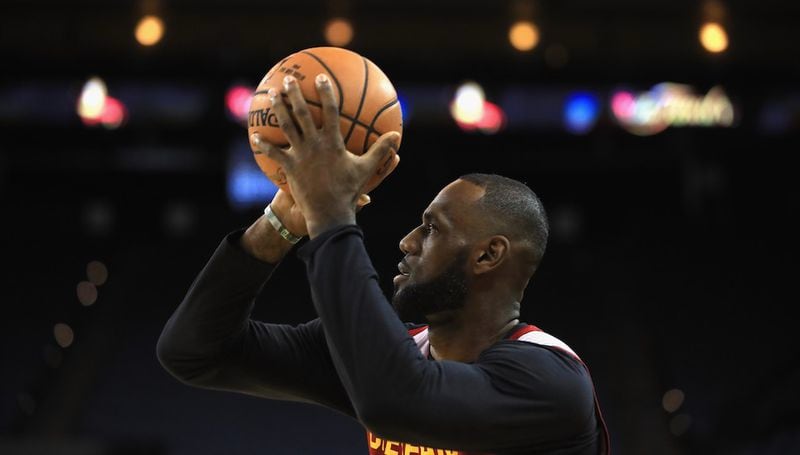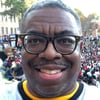On the eve of chasing his second consecutive NBA title, even LeBron James — with all of his glory, money and admiration — can’t run away from racism.
Early Wednesday, reports surfaced that James’ Los Angeles home had been vandalized with a racial slur. The slur, the N-word, was painted on the gate of his Brentwood estate, and the LAPD is investigating the incident as a hate crime and an act of vandalism.
» Noose found at African-American museum in D.C.
Neither James nor his family was in the 9,440-square-foot home that he bought for $21 million in 2015. James was in the Bay area preparing to lead the Cleveland Cavaliers into the NBA Finals, which start Thursday, against the Golden State Warriors.
» Share your experience of race in Georgia
"Hate, in America, especially for an African-American, is living every day,” an emotional James said. “Even though it's concealed most of the time — people will hide their faces and will say things about you and then when they see you they smile in your face — it's alive every single day.”
If one man in America knows exactly what James is going through, it is Atlanta’s Hank Aaron. In 1973 and 1974, as he was approaching Babe Ruth’s home run record, he was besieged with death threats and hate mail from people who didn’t want to see a black man break such a hallowed record.
“I can understand what LeBron is saying, because I felt the same way that he does,” Aaron said Thursday. “As I got older I was able to deal with it a little bit better. But I would go home at night and say, ‘what did I do wrong?’ Even now, I am 82 and I think about some of the things that happened. I just wanted to play baseball.”
With three NBA titles, four MVP awards and two Olympic gold medals, James’ name is already among the greatest to ever play basketball.
LeBron James just might be the most famous athlete in America, and with a billion dollar lifetime contract with Nike, is certainly one of the richest.
Earlier this week, ESPN names him the second most famous athlete in the world, behind only soccer’s Cristiano Ronaldo. Off the court, he earns $55 million in endorsement alone. He has 28.5 million Instagram followers, 22.6 million Facebook followers and 34.4 million people follow him on Twitter.
He is even slated to star in “Space Jam 2.”
None of that seemed to matter.
“LeBron has to see that he is one of the most enviable men in the world,” said Andrew Young, who before he became the mayor of Atlanta and a United Nations ambassador, was a noted civil rights leader who grew up in New Orleans – on the same street as a group of Nazis. “They hated on Muhammad Ali. They talked about Dr. King. They called him Martin Luther Coon.
“Being black is not his burden,” Young said. “It is being successful and being exceptional.”
In his statement, James said:
"No matter how much money you have, no matter how famous you are, no matter how many people admire you, being black in America is tough. And we've got a long way to go for us as a society, and for us as African-Americans, until we feel equal in America."
Aaron recalls rocks from fans in Savannah
Even before he was famous Aaron said he suffered. As an 18-year-old second baseman playing in Savannah in the old Sally League, he remembers being pelted with rocks from the stands. He also recalls staying in private homes while his white teammates slept in hotels
“I remember a guy I played with for 15 years, Warren Spahn, coming to me and asking, ‘What do y’all want?’” Aaron said, still incredulous. “I said, ‘We want the same thing you got. To be equal.’ Those are the things that are so obvious.”
Roy S. Johnson, a columnist for AL.com and a former NBA writer for the New York Times and assistant managing editor for Sports Illustrated, echoed James’ thought, calling racism “a living, breathing entity.”
“LeBron James is not the first rich or famous person to be called a nigger and will not be the last,” Johnson said. “He spoke the truth and a truth that many of us wished did not exist, but it does. That is the reality.”
‘I think back to Emmett Till’s mom’
According to a report issued by the Center for the Study of Hate and Extremism at California State University-San Bernardino, hate crimes in nine major U.S. metropolitan areas rose more than 20 percent last year.
Atlanta was not among the nine, but the incidents were said to have been fueled by the intense presidential campaign and a greater willingness of victims to report incidents.
Two weeks ago in Portland, two men were killed trying to protect a girl from a racist attack. And on the same day that James reported his incident, a noose was found inside the National Museum of African American History and Culture in Washington, D.C.
The new Smithsonian museum is also where the casket of Emmett Till is on display.
Till, 14, was brutally beaten and killed in 1955 by two white Mississippi men, after the teen was accused at whistling at the wife of one of the men.
Till’s mother, Mamie Till, insisted that her son’s bloated and battered body be put on display to show the world what happened to him. His death helped spark the modern civil rights movement. Said James:
"I think back to Emmett Till's mom, actually. It's kind of one of the first things I thought of. And the reason that she had an open casket is because she wanted to show the world what her son went through as far as the hate crime, and being black in America."
James then prepared for a basketball game.
Note: Commenting for this article is being moderated by AJC editors.









